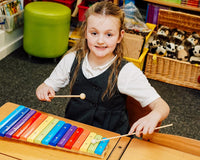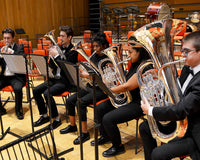Choosing the right instrument for you at the start of your musical journey can seriously impact the enjoyment of playing and determine if you would stick with the instrument. So, if you have decided to play the keys, one of the most common dilemmas is whether to go for a digital piano or electronic keyboard? In this article, I will highlight some of the main differences between a piano and keyboard to hopefully help you make a decision which of these awesome instruments is best for you.
Main differences between a piano and a keyboard: 
When shopping for their next instrument, people often ask what is the difference between a piano and a keyboard?
- It really isn't that easy to tell at first, as both digital pianos and electronic keyboards are, essentially, electronic representations of the piano to a certain extent.
- The thing that sets them apart is that digital piano is mainly designed to represent the natural, weighted feel, response, sound and sometimes even look of an acoustic piano.
- A digital piano will typically have a full size, 88 note keyboard and relevant technology in place to represent the natural piano sound as well as weighted key response.
- While digital pianos can be portable, they often feature a large wooden cabinet to recreate the look of a traditional acoustic instrument.
- Electronic keyboards, on the other hand, will often feature more instrumental and drum sounds than a digital piano, typically have fewer keys and are a lot easier to transport.
- They usually tend to feature more electronic components, which are great for playing a variety of genres and they do not necessarily have weighted keys, however, most keyboards will include piano sounds on-board.
Benefits of choosing a digital piano:

- I usually recommend a digital piano to aspiring musicians who are looking to go down a more traditional route, for example, if you are looking to do grades on the piano and particularly want to excel with your technique as a pianist.
- While you can get through the first 2-3 years of learning with a portable keyboard, you will need an instrument with a good response, weighted keys and natural piano sound to develop your skills and agility for more complex pieces.
- Digital pianos are typically more expensive than keyboards, however, they are an investment in your musicianship and usually last 5-10 years, with more expensive Clavinova models often boasting a life span of around 15 years.
- Many of us are often choosing pianos over keyboards because of their substantial look, and, because of the high demand in digital pianos, there is a wide variety of colours to choose from so you can match with the rest of your interior.
- However, if you do not have enough space for a cabinet piano, don't worry - there are still plenty of models available that are portable or simply have a slimmer look, designed to fit in any environment, while still maintaining a classy look.
- Digital pianos are a great choice if you wish to learn how to play the piano, without experiencing much difficulty transitioning to an acoustic instrument for exams, performances etc.
Benefits of choosing a portable keyboard:
- A portable keyboard is great for a variety of purposes - generally, student level keyboards are more budget-friendly, which makes many potential musicians lean towards them.
- Keyboards are great for children too, and, because of their wide variety of fun, on-board functions they can really motivate you to take up music.
- They also can help you learn to play piano and teach yourself as they often include really helpful lesson and chord functions that teach you the basics in an interactive way, using popular songs.
- If an electronic keyboard is something you are looking to progress on, they are really good, versatile instruments that will give you a great variety of sounds, rhythms, pretty much putting an entire band at your fingertips.
- Keyboard grades are different to piano, there is less emphasis on the complexity of each hand parts and it is more focused on your performance skills and making great use of all the instrument's functions.
You may also be interested in: Digital piano buying guide Keyboard buying guide 10 reasons why you should learn to play an instrument Learn piano
Also, if you are looking to progress as a composer or entertainer, a keyboard will definitely be a great choice for you. chords - a helpful guide
















